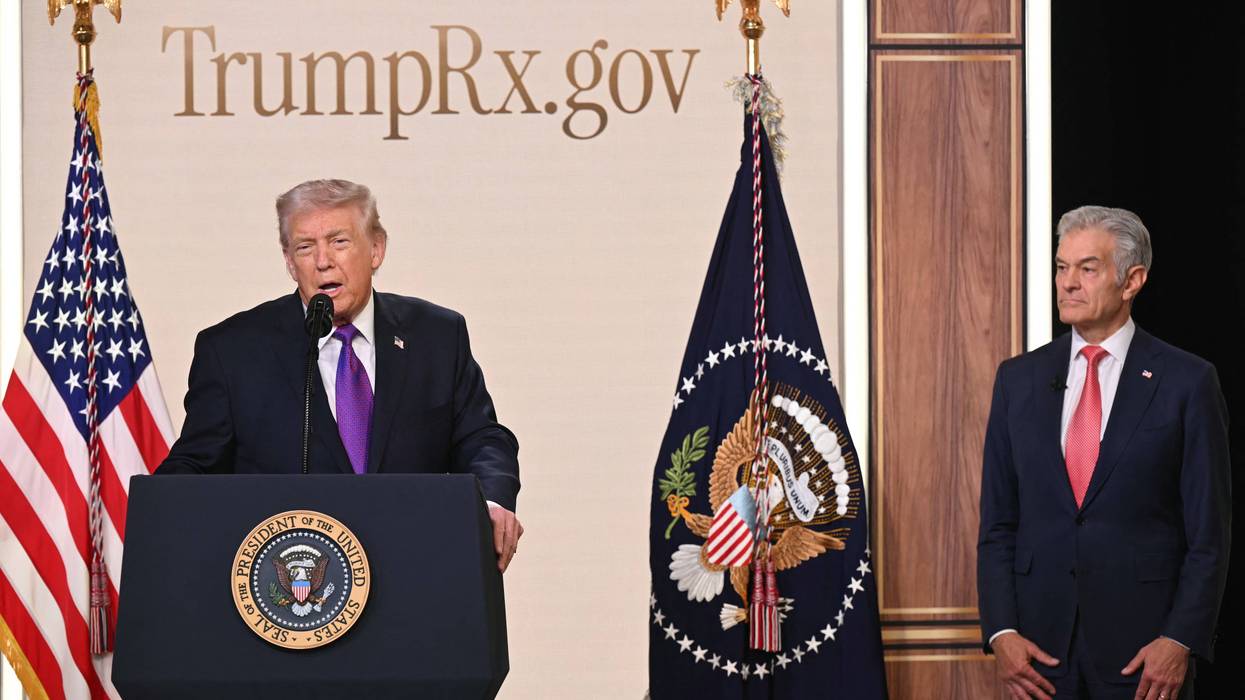TrumpRx.gov, launched in partnership with pharmaceutical giants, points users to direct-to-patient sales platforms hosted by drug companies to facilitate the purchase of an extremely limited selection of medications. For example, TrumpRx's listing for Farxiga links users to AstraZeneca Direct, where patients can pay out of pocket for the type 2 diabetes medication.
Donald Trump Jr. is on the board of BlinkRx, a prescription drug platform that stands to benefit from the Trump administration's promotion of direct-to-patient medicine sales. In December, the president's son reportedly met with top drug company executives and administration officials responsible for regulating the pharmaceutical industry—a gathering hosted by BlinkRx.
Frank Pallone Jr. (D-NJ), the top Democrat on the House Energy and Commerce Committee, said in a statement Thursday that TrumpRx "not only threatens patients’ health, safety, and privacy, but also likely includes kickback schemes designed to enrich President Trump, his family, and their friends."
"TrumpRx has been shrouded in secrecy from the beginning because the administration clearly does not want anyone to know it likely won’t save patients money," said Pallone. "However, we do know Trump only slaps his name on things when there’s something in it for him."
Last week, a group of Democratic senators sent a letter to the inspector general of the US Department of Health and Human Services warning that "without stricter safeguards before its official launch, TrumpRx could be used as a potential vehicle for unlawful kickback schemes that result in excessive costs for the federal government."
In addition to sending users to direct-to-patient sales sites, TrumpRx offers Trump-branded coupons for some medications. To obtain a coupon, site users must accept terms that state: "You agree that by redeeming this coupon, you (and anyone else acting on your behalf) agree not to seek reimbursement from any insurance plan for out-of-pocket costs for prescriptions purchased with this coupon. You also agree not to count the cost of prescriptions toward your deductible or true out-of-pocket costs."
The Washington Post reported that pharmaceutical companies "have agreed to list their drugs on TrumpRx.gov."
"TrumpRx is designed to help Big Pharma keep its prices high by diluting the bargaining power of insurance companies, weakening an important check on pharma."
Experts warned that patients who use TrumpRx could end up paying more for their medications than if they pursued other available options.
"TrumpRx’s offerings are very limited, fewer than 50 drugs listed, and most are niche products used by few patients," Rena Conti, an associate professor at Boston University, told ABC News. "Many are available in generic form at even lower prices or already available to consumers at low or even very low prices elsewhere. This suggests it pays for consumers to check their insurance coverage and ask their regular doctor or pharmacist before they use this service."
Peter Maybarduk, access to medicines director at Public Citizen, offered a more scathing assessment of TrumpRx, saying the president has "dressed up yet another corporate giveaway as a boon to patients."
"Most patients will do better through their insurance than through TrumpRx. Many patients without insurance will not be able to afford drugmakers’ still-high prices funneled through TrumpRx," said Maybarduk. "But drugmakers certainly will appreciate TrumpRx’s free promotion of their products, delivered with a false veneer of price accountability. TrumpRx is designed to help Big Pharma keep its prices high by diluting the bargaining power of insurance companies, weakening an important check on pharma."
“TrumpRx also appears to be another example of this president’s repeated corruption," he continued. "Trump’s son, Donald Trump Jr., sits on the board of BlinkRx, a key business that may benefit financially from TrumpRx. Getting serious about medicine affordability means getting serious about challenging Big Pharma. For all Trump’s talk, Big Pharma is getting a lot of special favors from this White House, while patients still are waiting. Real drug price reform doesn’t look like a website."
Throughout his second White House term, Trump has made outlandish promises to cut drug costs and hosted top executives at the White House to tout splashy deals—only for pharmaceutical giants to continue jacking up prices. Reuters reported last month that drugmakers planned to "raise US prices on at least 350 branded medications, including vaccines against Covid, RSV, and shingles and blockbuster cancer treatment Ibrance" in 2026.
Merith Basey, CEO of Patients for Affordable Drugs Now, said in a statement that the Trump administration's "voluntary agreements" with drug companies "lack clear enforcement mechanisms and still put the power to set and increase prices firmly in the hands of pharmaceutical corporations."
"Patients in our community will soon learn if they can reliably access these discounts at the pharmacy counter, where the program will ultimately be tested and where affordability matters most," Basey said of TrumpRx.




